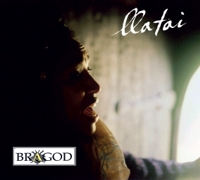Llatai
“Medieval and Renaissance Welsh poetry performed in all its glory, may not, on paper, sound like the most enthralling prospect. But believe me, when it’s done by the Cardiff-based duo Bragod – it is.” Verity Sharp, BBC Music Magazine
Buy this album now CD: £12 + p&p |
| Bragod - Profile page & index of recordings |
Track Listing
1) Yr Wylan, (The Seagull) Dafydd ap Gwilym, 14th century (8:44)
2) Offeren y Llwyn, (The Woodland Mass) Dafydd ap Gwilym, 14th century
(7:43)
3) Ymddiddan Arthur a’r Eryr, (Arthur’s
Talk with the Eagle) anonymous, 12th century (26:23)
Video
4) Trailer for film Recreating Bardic Music Michael Weihrauch (4:17)
Sleeve Notes Robert ap Huw’s manuscript of bardic music (The British Library, Robert ap Huw, MUSICA, Additional 14905) dates from 1613, making 2013 a significant anniversary for Welsh culture. This manuscript is at the core of Bragod’s repertoire and ‘Birds/Adar’ and the CD Llatai marks its 400th anniversary. Bragod performs two bardic poems by the 14th century poet, Dafydd ap Gwilym and ‘Ymddiddan Arthur a’r Eryr’, ‘Arthur’s Talk with the Eagle’, an anonymous, comic, morality-drama in verse. The music is from Robert ap Huw’s unique manuscript or closely based on it. This high-art poetry and music are presented now, as then, as an entity. Robert ap Huw’s manuscript, containing music from the 14th-16th century, reveals a musical language and tonal world radically different from folk or classical music. Parallels to the Welsh bardic tradition may be found today in African countries, where praise poetry to the accompaniment of virtuoso string music is still sung for powerful leaders. For the past 14 years Bragod has taken an historically informed approach to the presentation of bardic poetry and music, researching manuscript sources and developing performance-practice through experiment. Binary structures or measures are given in the manuscripts. Robert Evans plays these measures, ‘I’s and ‘O’s, on the crwth and Mary-Anne Roberts dances them as she sings the poems. The ‘I’s represent the eternal and the ‘O’s the temporal parts of the universe, as understood in the Middle Ages. The interplay of the temporal and the eternal is made audible in Welsh bardic music. Bragod invites listeners into an unfamiliar soundworld, rich in acoustic phenomena. In medieval Europe it was taught that there were 3 kinds of music. COSMIC MUSIC: generated by the revolving spheres of the heavens and experienced in the cycles of seasons and tides. HUMAN MUSIC: found in the harmonious proportions of the body, co-operative physical activity and ethical behaviour. INSTRUMENTAL AND VOCAL MUSIC: what we call music today, the practical aspects of making music. To engage in instrumental and vocal music was to participate in human and cosmic music. Welsh patrons paid professional poets, instrumentalists and singers, primarily to immortalise themselves and their ancestors and to confirm their social status. The poems on this disc are not conventional praise poems. The lyrics are reproduced in the CD booklet |
Credits Recorded, mixed and mastered by Dylan Fowler
at Stiwdio Felin Fach www.taithrecords.co.uk Photographs taken at Eglwys St Tysilio, Ynys
Môn, Capel Carmel, Rachub and Min Menai, Bangor |
| Instruments: | Crwth and voice |
| Genre: | Medieval
Welsh poertry and music |
| Format: | CD |
| Our Ref: | A0600 |
| MCPS: | BRA003 |
| Label: | Bragod |
| Year: | 2013 |
| Origin: | Wales |
 Messages
of human and divine love. Medieval Welsh poetry and music marking
400 years since Robert ap Huw copied his manuscript of bardic
music. Llatai is a recording of three pieces from Bragod’s
performance Birds/Adar.
Messages
of human and divine love. Medieval Welsh poetry and music marking
400 years since Robert ap Huw copied his manuscript of bardic
music. Llatai is a recording of three pieces from Bragod’s
performance Birds/Adar.